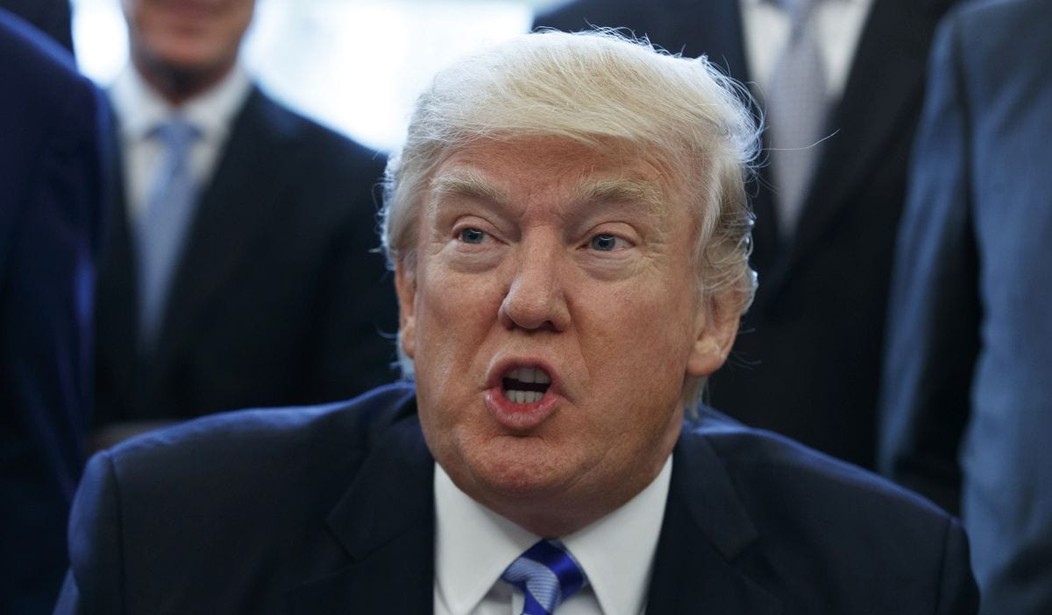When Donald Trump ordered a Tomahawk missile strike on the air base where Bashar-al Assad’s planes left with their lethal payload, he took the strong action which Barack Obama failed to take in 2013. Trump was correct when he said Assad’s latest atrocity was a “consequence of the past administration’s weakness and irresolution,” which had “created a sense of impunity for the Assad regime.” Unlike Obama, Trump was serious when he said that Assad’s use of sarin gas was a red line that called for a tough U.S. response.
However, when Assad used these grotesque weapons of mass destruction in 2013, Trump called on Obama to do just the opposite. In his tweets, Trump urged President Obama not to get involved in the Syrian conflict and insisted that congressional approval would be needed before any military response could take place.
Only a few days ago, he seemed to be of the same mind, until he wasn’t. A day before the strike, Ambassador Nikki Haley told the UN that there would not be a policy to remove Assad from power, and Secretary of State Tillerson had said that the “longer-term status of President [Bashar] Assad… will be decided by the Syrian people,” which seems like a cruel joke. At his daily press conference, Sean Spicer confirmed that approach and said that “with respect to Assad, there is a political reality that we have to accept.”
That view was certainly compatible with Trump’s pro-Russian approach; i.e., a desire to forge an alliance with Russia to fight ISIS, even though Putin is the main supporter and supplier of weapons to both the Assad regime in Syria and to the mullahs who rule Iran. And the world knows that Putin was never fighting ISIS in Syria; he allowed Aleppo to be destroyed for one reason: it was a rebel stronghold where ISIS was not even present. Putin’s only goal was to prop up Russian power in the region. Now Russia has responded to the air attack by denying that Assad used any chemical weapons, and by condemning the U.S. military response as a violation of international law and as an act of aggression.
Trump said Assad’s sarin gas attack and the pictures of suffering and dying babies led him to change his mind and order the air attack. Given the U.S.’s failure to act in the past, few expected Trump’s swift military response, least of all Assad, who believed he had free rein to terrorize, destroy, murder, and dispossess as many Syrians as he liked by any means he desired.
Indeed, at Mar-a-Lago this weekend, Trump reiterated that it was in the “vital national-security interest of the United States to prevent and deter the spread and use of deadly chemical weapons.” He added: “Tonight I call on all civilized nations to join us in seeking to end the slaughter and bloodshed in Syria, and also to end terrorism of all kinds and all types.”
This was a forceful statement, but many questions remain to be answered: What security interests outside of a shocked personal reaction led him to reevaluate his former policies? Will it only amount to a one-time warning? The move was tactical and caused no real damage to Assad’s military power. Clearly, it had symbolic repercussions, but to be effective, it must be followed by a clearly defined strategy, which one hopes will be forthcoming.
Cynics might argue that Trump’s actions were really motivated by his plummeting and historically low poll numbers; the majority of Americans think he is on the wrong course and is a bad leader. After all, when Obama was commander-in-chief, Trump tweeted that his poll numbers were “in tail spin” and that Americans should “watch for him to launch a strike in Libya or Iran.” I do not share that view of Trump’s motivation, but it is fair to ask, given that he attributed Obama’s announcement that he would take military action in 2013 (which he quickly abandoned) to that very same thing.
We’ll have to wait and see what happens this week when Rex Tillerson begins negotiations in Moscow with Russia’s foreign policy leaders, and perhaps Putin himself. The Russians are angry and will probably not afford the secretary of State a red carpet. Yet Tillerson is a known and even celebrated figure in Moscow; Putin once gave him Russia’s highest medal. If anyone can talk to Putin, it is probably Tillerson. It is doubtful that he will negotiate a deal like Obama’s in which Assad agreed to give up his chemical stockpiles and compliance was to be verified through careful and precise inspections by Western experts with guarantees from the Russians. We know how that went. Or will Trump adopt a policy meant to end Assad’s regime and institute a government that will negotiate a cease-fire and rebuild Syria?
While Trump’s poll numbers are bound to improve, his actions have not been universally appreciated and could alienate segments of his core constituency. After all, he had campaigned as someone who would work with Russia to destroy ISIS. He told Americans that he was going to pursue a nationalist “America First” policy, which differentiated him from Republican hawks like John McCain, Lindsey Graham, and Marco Rubio, and from neo-conservatives like Bill Kristol, Max Boot, and most of the editors of The Weekly Standard and Commentary. One of the strongest argument against Trump’s action comes from one of his formerly most ardent supporters, filmmaker Ronald F. Maxwell.
Even ardent Trump supporter Ann Coulter tweeted the following:
Trump campaigned on not getting involved in Mideast. Said it always helps our enemies & creates more refugees. Then he saw a picture on TV.
Similarly, the editors (including editor-in-chief Robert W. Merry) and writers for the voice of paleo-conservatism, The American Conservative, have opposed the turn, as has the much heralded Trump supporter and conspiracy theorist Mike Cernovich, as reported in The Washington Post. No wonder they are worrying about betrayal. Hillary Clinton was most supportive, probably feeling that Trump had done just what she would have had she won the election.
Whatever occurs, it will be a good outcome if Vladimir Putin, the Iranian regime, Kim Jong-Un, and the Chinese are shaken by the actions of the new and often unpredictable American president.









Join the conversation as a VIP Member